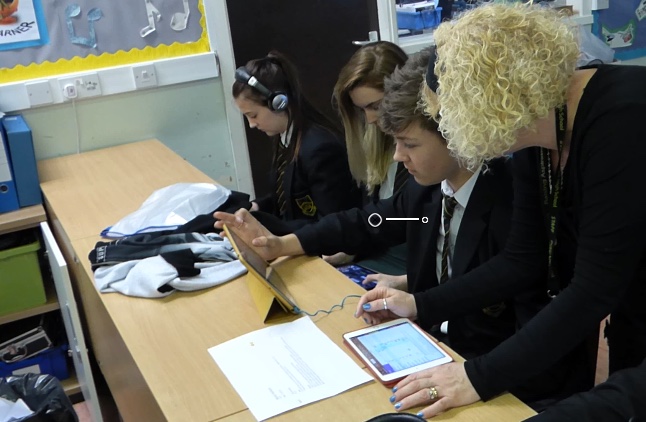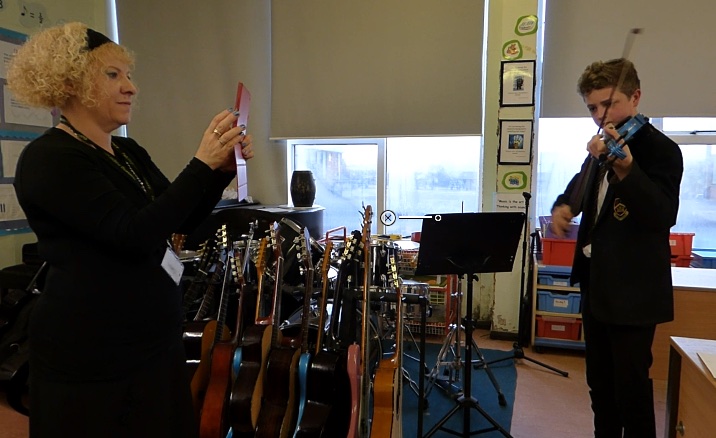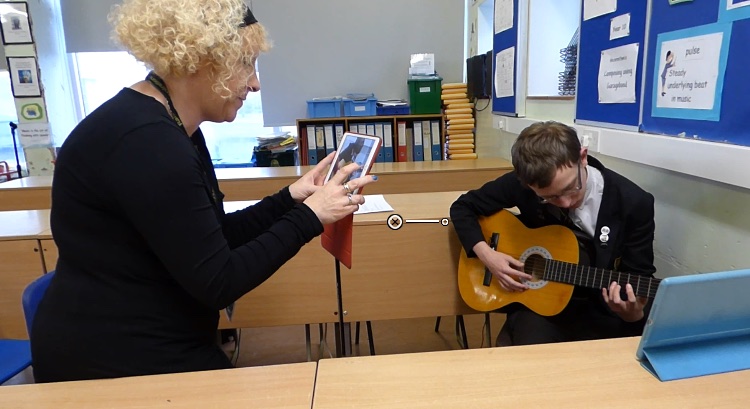Using mobile technology for Key Stage 3 music assessment
What is the context of the work?
Park High School, Colne (Lancashire) is an 11-16 comprehensive with 960 pupils. On entering the school, pupils achieve in line or slightly below national averages. Pupils come from a mixture of social and economic backgrounds, serving some local rural villages from affluent backgrounds and some areas of Colne with a high level of social deprivation.
Key Stage 3 includes Years 7 and 8, with approximately 200 students in each year group. Pupils are taught a weekly music lesson (55 minutes) in mixed ability groups of around 28 pupils. Fiona Lowden is the Head of Music, Assistant Curriculum leader for Creative Arts and the only classroom music teacher.

The use of Idoceo on the iPad as an assessment tool ( http://www.idoceo.net/index.php/en/ ) fits into the wider context of "Assessing, life without levels" (in relation to the design of the new National Curriculum in England) and the challenges and opportunities which this has presented.
What is the content of the work?
The initial aim was to investigate whether and how Idoceo could solve a number of assessment problems:
- How do effectively assess the progress of 400 pupils a week?
- What form should that assessment take?
- How do you have meaningful records of pupil progress which also satisfy whole school policies?
- Fiona Lowden (Head of Music) also wanted to address other assessment challenges:
- If best practice is regularly to record pupils' work, how do you effectively manage the storage of the audio/ video clips?
- How do you show progress over time?
- How does the teacher manage the notes used to jot down related to pupils' strengths and areas of development?
- How does the teacher turn the professional knowledge about what pupils can do and what they know into something that can be reported each term by the school?
Perhaps, most importantly, she needed a system that would work with 400 pupils without taking up huge amounts of time during lessons, and did not generate excessive work at home.

This is an iPad-based classroom management system that allows teachers to:
- Set up class lists, with pictures and relevant data, such as predicted grades, SEND, instruments played;
- Set up and edit seating plans, random name pickers;
- Mark book whilst walking around, on the fly;
- Act as a scheduler, planning diary;
- Supports communication with teachers, students, parents; and
- Links to resources.
What are the key features of the teaching and learning approach?
In terms of supporting music learning, the system allows the gathering of data such that:
- Learners can demonstrate their progress musically and verbally;
- All participants can take opportunities to give and receive feedback, and contribute to the review and development of activities and programmes;
- Learners know why and how their attainment is logged, and are well prepared for periodic assessments; and
- Learners know how to work towards formal assessment requirements, and understand the procedures for these.
What are the positive outcomes for children/young people?
Positive outcomes include:
- Educational/musical: The efficiency of the system allows teacher to free up more time to engage in musical interaction with the students; and
- Social/personal: The teacher has all the relevant pupil data at their fingertips.
What are the key features of teacher/leader behaviour that are enabling those positive outcomes?
There is a feeling of being in control (which is not the same as controlling) and on top of a range of administrative issues that makes for a more stress-free working environment. This helps everyone.

What are the key features of context, content and activities that are enabling those positive outcomes?
The system supports:
- Classroom management;
- Getting to know your students;
- Managing different teaching situations (whether individual, small group, whole class)
- Resource management;
- Assessment, feedback, reporting; and
- Communication.
How replicable or adaptable is it?
This is an easy to use system at comparatively low cost.
Resources
- iDoceo video playlist on inspire-music's YouTube channel: https://www.youtube.com/playlist?list=PLqQQgM1B3QHvB3lqDJskWWZGecilD68ND
- iDoceo useful tips for saving video work
